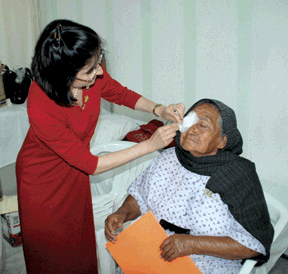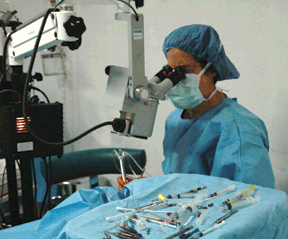
When the surgeons arrived early one morning in the rural mountain town of Jerez, Zacatecas, Mexico, the line of people waiting for their aid stretched around the block. Inside the 90-degree operating room, several of the most severely impaired patients sat on chairs borrowed from the host ophthalmologist’s backyard. In the same cramped room, there were three operating tables. A fan on loan from the same family provided the only relief from the heat.
“We would pick a patient and get started,” Dr. Anita Nevyas-Wallace C’80 M’83 recalls. In order to treat as many patients as possible, five operating stations were set up in two rooms. As one surgeon prepared for surgery in a station, another would be operating in that same station. This exhausting routine lasted from eight in the morning until well after midnight, with only a few 10-minute breaks in the day for the doctors to eat or rest.
Over a three-day period last July, Nevyas-Wallace and eight other volunteers with the nonprofit Surgical Eye Expeditions International performed several hundred free eye surgeries on the region’s impoverished residents.
“It was exhausting, but it was exciting,” Nevyas-Wallace says of the trip. “It was exhilarating, and there was real camaraderie among the staff. It was a wonderful experience, and the patients were so grateful.”
She recalls one woman in her sixties who had suffered from debilitating cataracts for so long that she’d never seen her grandchildren’s faces: “I took the bandage off and she was so excited. She started hugging us and blessing us and thanking us, and I was just so happy for her. Most of these patients were really handicapped by their cataracts.”

Most of the 132 surgeries Nevyas-Wallace performed in Jerez were cataract-removals. Since the patients she treated could not afford medical insurance and did not have the money to pay for a doctor’s visit, many of them would have gone blind without a volunteer effort.
Yet Nevyas-Wallace was surprised to discover that, despite their serious eye conditions, the Mexicans she met were “quite a healthy lot.”
“The standards for sterility were not what I’m accustomed to, and yet the infection rate is very low,” she explains. “I suspect that people who make it to adulthood under extraordinarily unsanitary conditions probably have robust immune systems.”
Nevyas-Wallace and the other volunteers experienced these sub-standard medical conditions firsthand. Instead of the high-quality surgical drape she typically uses to isolate the lid margin for cataract surgery, for instance, she had to use a piece of a sheet drape, cut a hole in it, sterilize it, and tape it to a patient’s face.
“That’s when I began to have some notion of what we were up against,” she says.
Another day, Nevyas-Wallace was horrified to see a fly in the operating room. It turned out that someone had opened all the doors to the small room in an attempt to alleviate the sticky heat.
Though she may not have imagined herself in a makeshift Mexican operating room when she entered Penn as a University Scholar in 1976, Nevyas-Wallace did see herself as a doctor. When she began medical school three years later, she was still unsure about which aspect of medicine to pursue. She soon settled on ophthalmology.
“I was fascinated by the fact that we could successfully repair something as complicated and delicate as an eye,” she explains. “That was very exciting to me.”
This excitement about eyes runs in the family. Nevyas-Wallace works alongside her mother and father at Nevyas Eye Associates, and recently her 17-year-old son Jonathan, a high-school senior, also got involved. Jonathan spent several weeks training as a cataract surgical technician so that he could assist his mother on her trip to Mexico. “He was an enormous help,” she says.
The trip was an eye-opening experience, not only for the visually impaired Mexicans she aided but for Nevyas-Wallace herself.
“When I saw how much could be done with so little in the way of supplies, I realized there were ways that we could be a lot less wasteful,” she explains. “I also gained a new appreciation for everything my staff here does.”
She hopes to return to Mexico, possibly as soon as this summer, to continue her volunteer efforts. “My one regret is that there were people we were not able to help,” she says, “and that’s why I’ll be going back.”
—Molly Petrilla C’06




